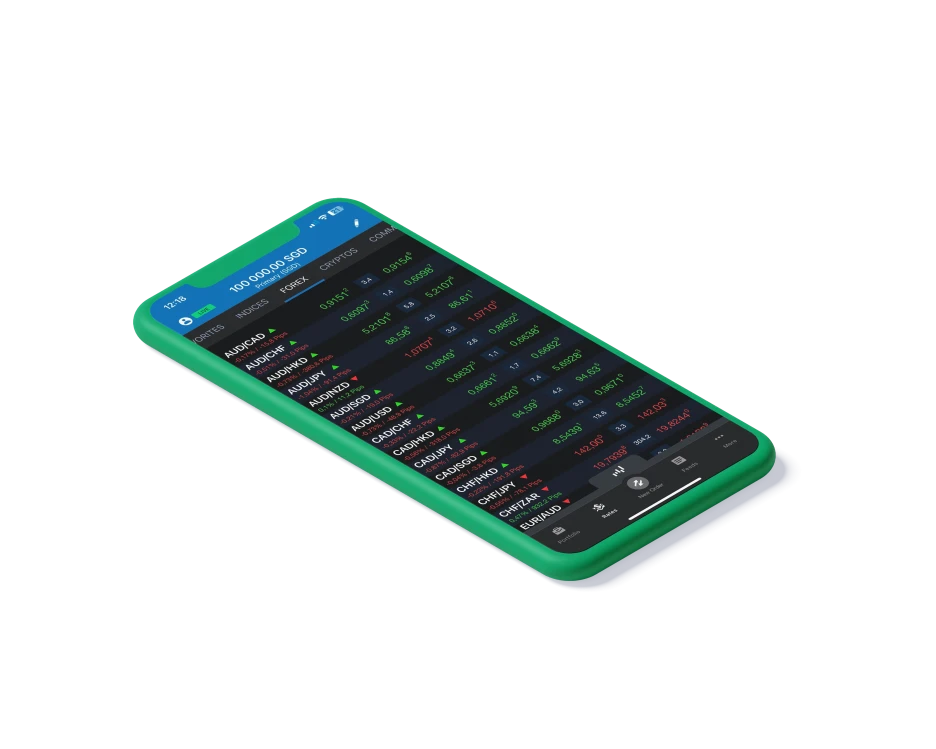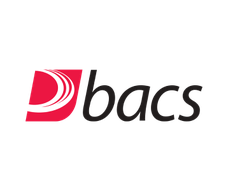See our margin rates and leverage ratios offered to retail clients for each of our instruments.
See our margin rates and leverage ratios offered to professional clients for each of our instruments.
Margin reflective of 30:1 max leverage
The maximum leverage for each asset class that OANDA (Europe) Limited can offer its retail clients is governed by the requirements of the Financial Conduct Authority (FCA) and European Securities and Markets Authority (ESMA). These restrictions do not apply to clients who are categorised as Professional, where OANDA (Europe) Limited determines the leverage that applies.

At certain times and in certain market conditions, our spreads could be wider than usual. This includes:
We offer clients the ability to trade with leverage. This means that you can enter into trades larger than your account balance and trade without depositing the full value of the trade that you wish to open. One of the benefits of trading with leverage is that you could potentially generate large profits relative to the amount invested. On the other hand, trading with leverage could also result in significant, rapid losses to your capital. You cannot, however, lose more than the funds available on your account.
We take a form of security (or deposit) against any losses that you may incur when you trade, this collateral is typically referred to as margin. The margin needed to open each trade is derived from the leverage limit associated with both your account type and the instrument you wish to trade.
Margin and maximum leverage for Retail Clients are governed by the Financial Conduct Authority who set the margin rates and maximum leverage for different asset classes. For more information about margin rates for Retail Clients, visit our Margin Rates and Leverage Ratios for Retail Clients page.
Margin calculations are different, depending on sub-account type. To better understand this, the below examples, illustrate these differences, inclusive of the potential impact around margin close out.
Let’s assume that you have two sub-accounts with a balance of GBP 50,000 on each.
You buy 1 mio EURGBP on both your v20 sub-account and your OANDA One sub-account at the same time and same price. EURGBP market price is 0.8566 / 0.8568 so you buy the 1 mio EURGBP at 0.8568.
| Bid | Mid | Offer | |
|---|---|---|---|
| EUR/GBP | 0.8566 | 0.8567 | 0.8568 |
| v20 sub-account | OANDA One sub-account | ||
|---|---|---|---|
| Balance | 50,000.00 | Balance | 50,000.00 |
| Margin_Used | 28,556.64 | Margin_Required | 28,559.97 |
| UPL_mid | -100.00 | UPL | -200.00 |
| NAV_mid | 49,900.00 | Equity | 49,800.00 |
| Margin_Available | 21,343.36 | Free_Margin | 21,240.03 |
| Margin_% | 28.61% | Margin_Level_% | 174.37% |
| Margin_Used = Margin_Rate * Trade_Quantity * Instrument_To_Home_Ccy Conversion current mid-rate <br/> </br> Margin_Used = 3.33333% x 1,000,000 x 0.8567 = 28.556.64 GBPThe position is revalued against the mid-price of EURGBP, so the position has: UPL_mid = Trade_Quantity x (Current mid – Trade price) = 1,000,000 x (0.8567 – 0.8568) = -100 GBPNAV_mid = Balance + UPL_mid = 50,000 – 100 = 49,900 GBPMargin_Available = NAV_mid – Margin_Used = 49,900 – 28,556.64 = 21,343.36 GBPMargin_% = (0.5 x Margin_Used) / NAV_mid = (0.5 x 28,556.64) / 49,900 = 28.61%The displayed “Margin_%” is a “Margin Closeout Percentage” that ranges from 0 up to 100%,; at which point a Margin Closeout event is triggered. | Margin_Required = Margin_Rate * Trade_Quantity * Instrument_To_Home_Ccy Conversion ‘time_of_trade’ sided-rateMargin_Required = 3.33333% * 1,000,000 * 0.8568 = 28,559.97 GBPThe position is revalued against the bid price of EURGBP, so the position has:UPL = Trade_Quantity x (Current bid – Trade price) = 1,000,000 x (0.8566 – 0.8568) = -200 GBPEquity = Balance + UPL = 50,000 – 200 = 49,800 GBPFree_Margin = Equity – Margin_Required = 49,800 – 28,559.97 = 21,240.03 GBPMargin_Level_% = Equity / Margin_Required = 49,800 / 28,559.97 = 174.37%The displayed “Margin_Level_%” is a “Margin Coverage Percentage” that ranges from infinity down to 50%, at which point a Margin Closeout event is triggered. |
|---|
At the point of trade opening, both sub-accounts act in a very similar way, except for the different representations for margin % and the different rate used for home currency conversion.
Some time later:
| Bid | Mid | Offer | |
|---|---|---|---|
| EUR/GBP Price | 0.8536 | 0.8537 | 0.8538 |
EURGBP has dropped in price by 30 pips.
| v20 sub-account | OANDA One sub-account | ||
|---|---|---|---|
| Balance | 50,000.00 | Balance | 50,000.00 |
| Margin_Used | 28,456.64 | Margin_Required | 28,559.97 |
| UPL_mid | -3,100.00 | UPL | -3,200.00 |
| NAV_mid | 46,900.00 | Equity | 46,800.00 |
| Margin_Available | 18,443.36 | Free_Margin | 18,240.03 |
| Margin_% | 30.34% | Margin_Level_% | 163.87% |
| Margin_Used = Margin_Rate * Trade_Quantity * Instrument_To_Home_Ccy Conversion current mid-rateMargin_Used = 3.33333% x 1,000,000 x 0.8537 = 28,456.64 GBP The position is revalued against the mid-price of EURGBP, so the position has:UPL_mid = Trade_Quantity x (Current mid – Trade price) = 1,000,000 x (0.8537 – 0.8568) = -3,100 GBPNAV_mid = Balance + UPL_mid = 50,000 – 3,100 = 46,900 GBPMargin_Available = NAV_mid – Margin_Used = 46,900 – 28,456.64 = 18,443.36 GBPMargin_% = (0.5 x Margin_Used) / NAV_mid = (0.5 x 28,456.64) / 46,900 = 30.34% | Margin_Required = Margin_Rate * Trade_Quantity * Instrument_To_Home_Ccy Conversion ‘time_of_trade’ sided-rateMargin_Required = 3.33333% * 1,000,000 * 0.8568 = 28,559.97 GBPThe position is revalued against the bid price of EURGBP, so the position has:UPL = Trade_Quantity x (Current bid – Trade price) = 1,000,000 x (0.8536 – 0.8568) = -3,200 GBPEquity = Balance + UPL = 50,000 –3,200 = 46,800 GBPFree_Margin = Equity – Margin_Required = 46,800 – 28,559.97 = 18,240.03 GBPMargin_Level_% = Equity / Margin_Required = 46,800 / 28,559.97 = 163.87% |
|---|
On the OANDA One sub-account, the initial margin amount (in Home currency units) is static, i.e. the margin amount reserved when you open the position stays constant throughout the life of the position.
v20 sub-accounts use only mid-rates in all UPL and conversion calculations for margin purposes.
OANDA One sub-accounts use relevant sided-rates in all UPL and conversion calculations.
At a margin closeout scenario:
| Bid | Mid | Offer | |
|---|---|---|---|
| EUR/GBP Price | 0.82107 | 0.82117 | 0.82127 |
EURGBP has dropped in price by some 350+ pips.
| v20 sub-account | OANDA One sub-account | ||
|---|---|---|---|
| Balance | 50,000.00 | Balance | 50,000.00 |
| Margin_Used | 27,372.31 | Margin_Required | 28,559.97 |
| UPL_mid | -35,630.00 | UPL | -35,730.00 |
| NAV_mid | 14,370.00 | Equity | 14,270.00 |
| Margin_Available | -13,002.31 | Free_Margin | -14,289.97 |
| Margin_% | 95.24% | Margin_Level_% | 49.97% |
| Margin_Used = Margin_Rate * Trade_Quantity * Instrument_To_Home_Ccy Conversion current mid-rateMargin_Used = 3.33333% x 1,000,000 x 0.82117= 27,372.31 GBP The position is revalued against the mid-price of EURGBP, so the position has:UPL_mid = Trade_Quantity x (Current mid – Trade price) = 1,000,000 x (0.82117 – 0.8568) = -35,630 GBPNAV_mid = Balance + UPL_mid = 50,000 – 35,630 = 14,370 GBPMargin_Available = NAV_mid – Margin_Used = = 14,370.00 – 27,372.31 = -13,002.31 GBPMargin_% = (0.5 x Margin_Used) / NAV_mid = (0.5 x 27,372.31) / 14,370 = 95.24% | Margin_Required = Margin_Rate * Trade_Quantity * Instrument_To_Home_Ccy Conversion ‘time_of_trade’ sided-rateMargin_Required = 3.33333% * 1,000,000 * 0.8568 = 28,559.97 GBPThe position is revalued against the bid price of EURGBP, so the position has:UPL = Trade_Quantity x (Current bid – Trade price) = 1,000,000 x (0.82107 – 0.8568) = -35,730 GBPEquity = Balance + UPL = 50,000 –35,730 = 14,270 GBPFree_Margin = Equity – Margin_Required = 14,270 – 28.559.97 = -14,289.97 GBPMargin_Level_% = Equity / Margin_Required = 14,270 / 28,559.97 = 49.97% |
|---|
Let’s assume that you have two sub-accounts with a balance of GBP 50,000 on each.
You buy 1 mio EURUSD on both your v20 sub-account and your OANDA One sub-account at the same time and same price. EURUSD market price is 1.0780 / 1.0782 so you buy the 1 mio EURUSD at 1.0782.
Immediately after making the trade:
| Bid | Mid | Offer | |
|---|---|---|---|
| EUR/USD | 1.0780 | 1.0781 | 1.0782 |
| GBP/USD | 1.2590 | 1.2591 | 1.2592 |
| EUR/GBP | 0.8561 | 0.85625 | 0.8564 |
| v20 sub-account | OANDA One sub-account | ||
|---|---|---|---|
| Balance | 50,000.00 | Balance | 50,000.00 |
| Margin_Used | 28,541.64 | Margin_Required | 28,546.64 |
| UPL_mid | -79.42 | UPL | -158.86 |
| NAV_mid | 49,920.58 | Equity | 49,841.14 |
| Margin_Available | 21,378.94 | Free_Margin | 21,294.50 |
| Margin_% | 28.59% | Margin_Level_% | 174.60% |
| Margin_Used = Margin_Rate * Trade_Quantity * Instrument_To_Home_Ccy Conversion current mid-rateMargin_Used = 3.33333% x 1,000,000 x 0.85625 = 28,541.64 GBPThe position is revalued against the mid-price of EURUSD, so the position has:UPL_mid = Trade_Quantity x (Current mid – Trade price) x Quote_To_Home_Ccy Conversion current mid-rate = 1,000,000 x (1.0781 – 1.0782) x (1/1.2591 )= -79.42 GBPNAV_mid = Balance + UPL_mid = 50,000 – 79.42 = 49,920.58 GBPMargin_Available = NAV_mid – Margin_Used = 49,920.58 – 28,541.64 = 21,378.94 GBPMargin_% = (0.5 x Margin_Used) / NAV_mid = (0.5 x 28,541.64) / 49,920.58 = 28.59% | Margin_Required = Margin_Rate * Trade_Quantity * Instrument_To_Home_Ccy Conversion ‘time_of_trade’ sided-rateMargin_Required = 3.33333% * 1,000,000 * 0.8564 = 28,546.64 GBPThe position is revalued against the bid price of EURUSD, so the position has:UPL = Trade_Quantity x (Current bid – Trade price) x Quote_To_Home_Ccy Conversion current sided-rate = 1,000,000 x (1.0780 – 1.0782) x (1/1.2590 )= -158.86 GBPEquity = Balance + UPL = 50,000 – 158.86 = 49,841.14 GBPFree_Margin = Equity – Margin_Required = 49,841.14 – 28,546.64 = 21,294.50 GBPMargin_Level_% = Equity / Margin_Required = 49,841.14 / 28,546.64 = 174.60%NotesIf the UPL is a negative value, then we use the ask side of the current quote/home price (in this case USD/GBP). If the UPL is a positive number, then we use the bid of USD/GBP. The bid of USD/GBP is the reciprocal of the ask of GBP/USD and vice versa.In this case, the value is -$200, so we use the ask price of USD/GBP; that is 1/1.2590. |
|---|
Some time later:
| Bid | Mid | Offer | |
|---|---|---|---|
| EUR/USD | 1.0720 | 1.0721 | 1.0722 |
| GBP/USD | 1.2470 | 1.2471 | 1.2472 |
| EUR/GBP | 0.8595 | 0.85965 | 0.8598 |
EURUSD has dropped in price by 60 pips while GBPUSD has decreased by 120 pips, with EURGBP moving accordingly.
| v20 sub-account | OANDA One sub-account | ||
|---|---|---|---|
| Balance | 50,000.00 | Balance | 50,000.00 |
| Margin_Used | 28,654.97 | Margin_Required | 28,546.64 |
| UPL_mid | -4,891.35 | UPL | -4,971.93 |
| NAV_mid | 45,108.65 | Equity | 45,028.07 |
| Margin_Available | 16,453.68 | Free_Margin | 16,481.43 |
| Margin % | 31.76% | Margin_Level_% | 157.74% |
| Margin_Used = Margin_Rate * Trade_Quantity * Instrument_To_Home_Ccy Conversion current mid-rateMargin_Used = 3.33333% x 1,000,000 x 0.85965 = 28,654.97 GBPThe position is revalued against the mid-price of EURUSD, so the position has:UPL_mid = Trade_Quantity x (Current mid – Trade price) x Quote_To_Home_Ccy Conversion current mid-rate = 1,000,000 x (1.0721 – 1.0782) x (1/1.2471 )= -4,891.35 GBPNAV_mid = Balance + UPL_mid = 50,000 – 4,891.35 = 45,108.65 GBPMargin_Available = NAV_mid – Margin_Used = 45,108.65 – 28,654.97 = 16,453.68 GBPMargin_% = (0.5 x Margin_Used) / NAV_mid = (0.5 x 28,654.97) / 45,108.65 = 31.76% | Margin_Required = Margin_Rate * Trade_Quantity * Instrument_To_Home_Ccy Conversion ‘time_of_trade’ sided-rateMargin_Required = 3.33333% * 1,000,000 * 0.8564 = 28,546.64 GBPThe position is revalued against the bid price of EURUSD, so the position has:UPL = Trade_Quantity x (Current bid – Trade price) x Quote_To_Home_Ccy Conversion current sided-rate = 1,000,000 x (1.0720 – 1.0782) x (1/1.2470 )= -4,971.93 GBPEquity = Balance + UPL = 50,000 – 4,971.93 = 45,028.07 GBPFree_Margin = Equity – Margin_Required = 45,028.07– 28,546.64 = 16,481.43 GBPMargin_Level_% = Equity / Margin _Required = 45,028.07 / 28,546.64 = 157.74% |
|---|
At a margin closeout scenario:
| Bid | Mid | Offer | |
|---|---|---|---|
| EUR/USD | 1.03418 | 1.03428 | 1.03438 |
| GBP/USD | 1.2320 | 1.2321 | 1.2322 |
| EUR/GBP | 0.8393 | 0.83945 | 0.8396 |
EURUSD has dropped in price by about 440 pips while GBPUSD has decreased by 270 pips, with EURGBP moving accordingly.
| v20 sub-account | OANDA One sub-account | ||
|---|---|---|---|
| Balance | 50,000.00 | Balance | 50,000.00 |
| Margin_Used | 27,981.64 | Margin_Required | 28,546.64 |
| UPL_mid | -35,646.46 | UPL | -35,730.52 |
| NAV_mid | 14,353.54 | Equity | 14,269.48 |
| Margin_Available | 13,628.10 | Free_Margin | 14,277.16 |
| Margin_% | 97.47% | Margin_Level_% | 49.99% |
| Margin_Used = Margin_Rate * Trade_Quantity * Instrument_To_Home_Ccy Conversion current mid-rateMargin_Used = 3.33333% x 1,000,000 x 0.83945 = 27,981.64 GBPThe position is revalued against the mid-price of EURUSD, so the position has:UPL_mid = Trade_Quantity x (Current mid – Trade price) x Quote_To_Home_Ccy Conversion current mid-rate = 1,000,000 x (1.03428 – 1.0782) x (1/1.2321 ) = - 35,646.46 GBPNAV_mid = Balance + UPL_mid = 50,000 – 35,646.46 = 14,353.54 GBPMargin_Available = NAV_mid – Margin_Used = 14,353.54 – 27,981.64 = - 13,628.10Margin_% = (0.5 x Margin_Used) / NAV_mid = (0.5 x 27,981.64) / 14,353.54 = 97.47% | Margin_Required = Margin_Rate * Trade_Quantity * Instrument_To_Home_Ccy Conversion ‘time_of_trade’ sided-rateMargin_Required = 3.33333% * 1,000,000 * 0.8564 = 28,546.64 GBPThe position is revalued against the bid price of EURUSD , so the position has:UPL = Trade_Quantity x (Current bid – Trade price) x Quote_To_Home_Ccy Conversion current sided rate = 1,000,000 x (1.03418 – 1.0782) x (1/1.2320 )= -35,730.52 GBPEquity = Balance + UPL = 50,000 – 35,730.52 = 14,269.48 GBPFree_Margin = Equity – Margin_Required = 14,269.48 – 28,.546.64 = - 14,277.16 GBPMargin_Level_% = Equity / Margin_Required = 14,269.48 / 28,546.64 = 49.99% |
|---|
The amount of margin needed to hold the position open (Margin_Required) remains constant throughout the life of the trade in the OANDA One sub-account. In the v20 sub-account, the amount of margin needed (Margin_Used) is dynamic since it increases or decreases as conversion rate changes.
All calculations relevant for margin purposes for the OANDA One sub-account use appropriately sided market prices (so are affected by spread changes even if there is no change in mid-price). Calculations for the v20 sub account always only use mid-prices.
A margin closeout event is initiated/triggered:
A Margin Closeout event results:
Note: If a market in an underlying Instrument is closed or halted, those open trades will be skipped during the MCO process since they cannot be liquidated at the time.
Go from application to trading in three easy steps:



^Subject to meeting our criteria. Additional information/documentation may be requested prior to account activation to establish eligibility.
Price volatility and changes in global market liquidity can result in large spread increases around market openings and closings, following news announcements, and during times of uncertainty. At such times, our spreads usually widen to reflect market conditions. However, there may be occasions during which we opt to implement a fixed spread rather than allowing a spread to continue to widen.
If you leave trades open during the weekend or before markets close, or in the event that a particular market is suspended, you cannot close them until the markets reopen. Note that prices may change significantly or "gap" when trading resumes. If prices move against you, a margin closeout may be triggered when trading resumes if you have insufficient funds on your account to support your trading.
Spreads (the difference between the bid price and the ask price) typically widen just prior to closure of the markets and when they open, to reflect decreased liquidity in the global markets. These widened spreads could trigger stop-loss orders or margin closeouts when a position is open at this time.
Margin calls are an important aspect of leveraged trading. If the balance in your account falls to a level that is close to the regulatory 50% margin close out rule, a margin call will be triggered. If this happens, you might want to consider adding more funds to your account or closing positions to make sure your account balance is greater than the margin required to maintain open positions.
If one or more of your positions is close to margin closeout, you will receive a margin call alert by email. Margin call alert emails are sent at 9pm GMT daily.
You can avoid margin closeouts by reducing the amount of margin you are using. This can be done by closing some trades.
Note: In a fast moving market, there may be little time between warnings, or there may not be sufficient time to warn you at all. Be mindful of the “margin closeout percent” field in the account summary of the OANDA user interface. The closer the margin closeout percent is to 100%, the closer you are to a margin closeout.
With over 25 years experience, we offer multiple platforms and powerful tools to help you trade smarter.
Our pricing policy
Our pricing is sourced from a global network of liquidity providers. Market volatility and market liquidity are two primary factors that affect spreads.
What are financing costs?
Financing costs can affect your cost of trading, so it's important to understand how financing works.
Hours of operation
Our operation hours coincide with the global financial markets. Find out when you can trade with us.






